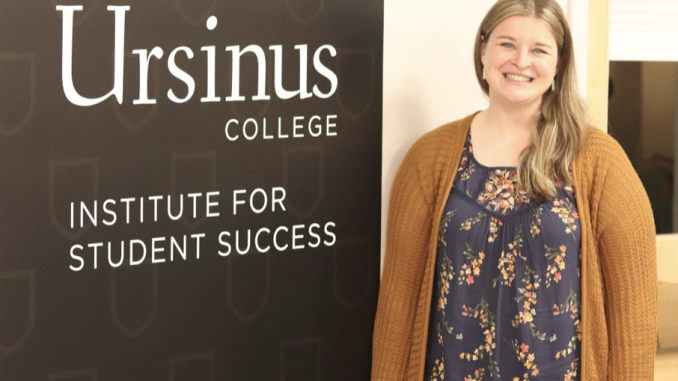
Kate Horan (kahoran@ursinus.edu)
Many people find themselves struggling with obstacles in their lives, and want to change their lives for the better. Sometimes people have this desire but do not know where to start. Seeking help can be difficult, however, there is an easily available resource on campus that facilitates healthy processing and productive growth: Laura Cunningham.
Cunningham joined the Institute for Student Success Office at Ursinus in July of 2019 as the Director of Scholarship Experiences. Additionally, she became a Master Certified Professional Life Coach in January of 2022. She is a Master Certified Professional Life Coach, a Gallup-Certified Strengths Coach, and a Myers-Briggs Type Indicator (MBTI) Certified Practitioner. Some people may not consider seeking help from a life coach because they think that they do not qualify as a proper client or believe that they do not need any help. However, Cunningham’s mentality is: “If they have a goal, they’re good with life coaching.”
Cunningham emphasizes the clear distinction between therapy and life coaching, stressing that she is not a licensed mental health clinician. She describes life coaching as “more of listening alongside someone as they are processing through whatever is happening.” While that may sound vague, this is one of the things that Cunningham loves about life coaching. She loves how person-specific life coaching is and how she can “talk with one person about time management with classes, or I can talk with somebody else about finding a place of worship near campus that they can use, or I can talk with somebody about working through conflict resolution.”
Meetings with Cunningham are typically a half hour or an hour. She starts off by asking two questions: “What would you like to talk about?” and “How will you know that we have talked about what you wanted to talk about?” This mean, “essentially, what are your goals for today and how do you know that we’ve made progress towards those goals?” These questions make goals more specific. From there, Cunningham says that the meeting goes wherever the student takes it and consists of a lot of listening on her part. She believes that the meeting should be more about the student processing things rather than her “swooping in” and telling them what to do. This improves the flow of the meeting.
Using a “wellness wheel” in her approach to coaching, Cunningham talks about the different areas of wellness: financial, social, physical, spiritual, intellectual, and mental. “Essentially, we’re holistic beings. And sometimes, for example, if we’re spending so much of our effort in the social category, it could be that we might need to do a little bit more work in our academic section just to kind of help bring a little bit more balance to our wellness wheel,” she explained. Cunningham also focuses on how things fit within the context of being a student, taking into account aspects such as if the student lives on campus, if the student wants to be social, if the student is part of an athletic team, etc.
“So, I’ve wanted to become a life coach for years, and thankfully Ursinus provided the opportunity for me to take the classes to become a life coach and has given me space here to offer it. [Ursinus] provides me the opportunity to have what I think are meaningful conversations. And I hope they’re meaningful to students too,” said Cunningham. She has worked with college students for over ten years and loves having conversations that help them process things and take the next step. According to Cunningham, the goal is that students take enough steps that they are able to pass their classes, graduate, and launch out of college more well-rounded so that they can better adapt to life after college.
While Cunningham is working to impact students’ lives, the practice of life coaching also impacts her personally. “There’s ‘aha!’ moments that students have or when students set goals and even if they didn’t meet their goals but they’re making progress towards them or when they’re celebrating those goals. Those are the moments that feel good to me,” she explained. Cunningham enjoys sitting in those moments when things are connecting for students.
Cunningham points out that we live in a very self-care conscious culture. She believes that self-care can be beneficial to minimize burnout and help people to reset, however, people should not depend on it. “Live a life that’s balanced enough that you don’t need to look at superficial self-care as the answer. Live a life where you, in a given week, are on top of your schoolwork enough and you also have enough time to be social and you have enough time to go walk on the Perkiomen trail,” she added. “Like kind of set yourself up so that you minimize burnout, and you don’t need to rely on the kitschy self-care to pull you through.” Cunningham acknowledges that not every day is going to be perfectly balanced, but her biggest advice for students is to practice setting themselves up well. Cunningham can be contacted at lcunningham@ursinus.edu to schedule an appointment.
Life coaching is a deeply beneficial practice, and it is evident that Cunningham is very committed to increasing students’ success and well-being. With her hard work and positive, supportive presence on campus, she brings a whole new meaning to the word “dedication.”
